|
|
|
Sort Order |
|
|
|
Items / Page
|
|
|
|
|
|
|
| Srl | Item |
| 1 |
ID:
185187
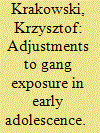

|
|
|
|
|
| Summary/Abstract |
The article investigates how exposure to gang-affiliated peers affects social behaviors and attitudes of early adolescents. Much of the literature finds that exposure to gangs contributes to adolescents’ antisocial behaviors. According to other studies, however, gang exposure can also promote prosocial behaviors. The present article re-examines this contradictory evidence, exploring potential complementarity of both reactions to gangs. Using a survey of 1,782 adolescents aged ten to 13 from rural Colombia, I compare adolescents who are and are not in a school class with members of youth gangs. I exploit the fact that schools in rural Colombia are unsegregated. Moreover, the presence of youth gangs across these schools is linked to incidence of historic armed conflict rather than typical forms of social disadvantage. This comparative setting thus allows me to establish an unconfounded relationship between exposure to gang-affiliated classmates and social outcomes. The analysis reveals gender differences in the effect of youth gang exposure. I find that girls react to male gang classmate by increased involvement in prosocial organizations. Boys, by contrast, adjust to male gangs by expressing more antisocial attitudes. There are no gender differences in the effect of gang classmates on alcohol consumption (an indicator of antisocial behavior). The article shows that the well-documented antisocial adjustments to gangs are – population-wide – complemented by prosocial adjustments, with gender being a key moderator. I discuss the implications of these findings for theories of violence and social change after conflict.
|
|
|
|
|
|
|
|
|
|
|
|
|
|
|
|
| 2 |
ID:
185192
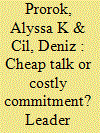

|
|
|
|
|
| Summary/Abstract |
This article examines how leaders affect the implementation of peace agreements. It argues that implementation is more likely when leaders have publicly committed to peace because public commitments tie leaders’ hands, making it costly to back down from peaceful promises. This effect is hypothesized to hold even under conditions that make implementation costly: when implementing difficult provisions, when spoiler risk is high, and when implementation is unreciprocated. These expectations are tested using novel data from the IPAD dataset on the implementation of peace agreements between 1989 and 2014 and on public statements by state and rebel leaders. Results show that governments and rebel groups whose leaders have publicly committed to peace are significantly more likely to make progress toward implementation. This effect holds for difficult provisions, when spoiler risk is high, and when implementation is unreciprocated. These findings highlight the importance of leaders’ political will for successful implementation of peace agreements and sustainable peace.
|
|
|
|
|
|
|
|
|
|
|
|
|
|
|
|
| 3 |
ID:
185190
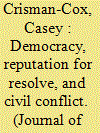

|
|
|
|
|
| Summary/Abstract |
There is a long-running disagreement about how regime type affects a country’s ability to project resolve. Specifically, there is an open question about whether being a democracy helps or hurts a country’s reputation for resolve. I consider this question by directly estimating a state’s reputation for resolve using a unified theoretical and statistical approach. To be precise, I derive an empirical model from a dynamic game of continuous-time bargaining where each side fights in order to build a reputation for resolve. I then fit this model using data on the duration and termination of civil conflicts between 1946 and 2009. I find that while governments tend to have stronger reputations for resolve than the rebels they face, democracies are seen as much less likely to be resolved both prior to and during conflict than their autocratic counterparts. Likewise, democracies are more likely to end a conflict by making a policy change in favor of the rebels than autocracies. Despite these differences, both democracies and autocracies experience a discrete increase in their reputations for resolve once conflict begins, with democracies receiving a much larger boost. As such, these findings contrast with a large literature on democratic credibility theory, while simultaneously providing evidence consistent with some of the logic behind democratic credibility theory.
|
|
|
|
|
|
|
|
|
|
|
|
|
|
|
|
| 4 |
ID:
185194
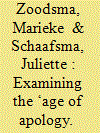

|
|
|
|
|
| Summary/Abstract |
It is often assumed that we are currently living in an ‘age of apology’, whereby countries increasingly seek to redress human rights violations by offering apologies. Although much has been written about why this may occur, the phenomenon itself has never been examined through a large-scale review of the apologies that have been offered. To fill this gap, we created a database of political apologies that have been offered for human rights violations across the world. We found 329 political apologies offered by 74 countries, and cross-nationally mapped and compared these apologies. Our data reveal that apologies have increasingly been offered since the end of the Cold War, and that this trend has accelerated in the last 20 years. They have been offered across the globe, be it that they seem to have been embraced by consolidated liberal democracies and by countries transitioning to liberal democracies in particular. Most apologies have been offered for human rights violations that were related to or took place in the context of a (civil) war, but there appears to be some selectivity as to the specific human rights violations that countries actually mention in the apologies. On average, it takes more than a generation before political apologies are offered.
|
|
|
|
|
|
|
|
|
|
|
|
|
|
|
|
| 5 |
ID:
185186
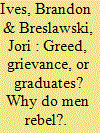

|
|
|
|
|
| Summary/Abstract |
Education is widely known for its positive effect on conventional politics and nonviolent protest as well as its suppressive effect on violence. However, recent studies have connected education to violence through its effect on relative deprivation and frustration–aggression mechanisms. We address these divergent findings by presenting a theory of the conditional effect that education has on violence. To do so, we build on literature addressing education’s positive association with political participation, such as voting and protests, and question how this relationship translates to contexts in which conventional and nonviolent channels are unlikely to be effective – specifically, in cases of politically excluded ethnic groups. We argue that education increases ethnic group members’ resources and desire to address grievances. Yet, because the ethnic group is politically excluded, opportunities for conventional politics and nonviolent protest are limited. Educated ethnic group members are limited in political options, and are thus more likely to address their grievances through the support of rebel groups, increasing the probability of violence. Violence then occurs in localities where members of a politically excluded ethnic group are located and where those members have higher levels of education. Using geo-spatial data and statistical analysis, we demonstrate that education has divergent effects on violence in areas populated by politically excluded versus politically included ethnic groups in Africa and Central America. Areas with highly educated politically excluded ethnic group members are the most likely to experience violent events.
|
|
|
|
|
|
|
|
|
|
|
|
|
|
|
|
| 6 |
ID:
185188
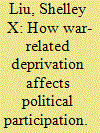

|
|
|
|
|
| Summary/Abstract |
How does civil war affect citizen engagement with democracy? Civilians who live through warfare face numerous disruptions to everyday life that can have permanent effects on political engagement even after peace is achieved. This article analyzes the role of depressed living standards resulting from education loss during the Liberia Civil War as a case study of war-related deprivation. I argue that the negative effects of war on education and economic outcomes clash with the expectations that citizens have for postwar democracy, with adverse consequences for political participation. I demonstrate support for this argument using a mixed methods approach, combining qualitative interviews with census, voting, and Afrobarometer survey data. I leverage a difference-in-differences identification strategy to causally identify the negative impact of conflict on human capital for a generation of young adults, and on the downstream consequences of disruptions in education on political participation. Results indicate that children who were of school age during the civil war are differentially less likely to have any formal schooling by the end of the war. I further find that educational deficiencies disproportionately decrease postwar job prospects, breeding resentment against the newly elected government. This extends to political participation: those who lost out on educational opportunities due to war exhibit lower political engagement and less desire to engage with democratic processes.
|
|
|
|
|
|
|
|
|
|
|
|
|
|
|
|
| 7 |
ID:
185191
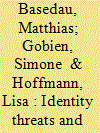

|
|
|
|
|
| Summary/Abstract |
Religion has become increasingly contentious in recent years. Faith-based discrimination, hostility and violence seem to have increased worldwide. But how can faith lead to conflict? In this article, we test the impact of two important dimensions of religion that have been neglected in previous research: the belief in ‘one true religion’ and perceptions of threats by other religious groups. Putting these two potential drivers to the test, we conducted a representative survey experiment with 972 respondents in Dar es Salaam, Tanzania. Results show that one of the tested dimensions, perceptions of threats by others, increases the support to use violence to defend one’s own group. This is particularly the case for religiously intolerant respondents with characteristics such as pre-existing threat perceptions, unfavorable views on intermarriage, or belief in the superiority of their own faith. In contrast, we find relatively weak evidence that the prime of ‘one true religion’ increases the readiness to use violence. Our findings have important implications for policy: We conclude that appeals by leaders to threats by others and intolerance toward other faiths can contribute to more conflict. Political and religious leaders should refrain from capitalizing on such notions and should promote tolerance towards other faiths instead.
|
|
|
|
|
|
|
|
|
|
|
|
|
|
|
|
| 8 |
ID:
185195
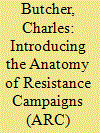

|
|
|
|
|
| Summary/Abstract |
We introduce the Anatomy of Resistance Campaigns (ARC) dataset, which records information on 1,426 organizations that participated in events of maximalist violent and nonviolent contention in Africa from 1990 to 2015. The ARC dataset contains 17 variables covering organization-level features such as type, age, leadership, goals, and interorganizational alliances. These data facilitate new measurements of key concepts in the study of contentious politics, such as the social and ideological diversity of resistance episodes, in addition to measures of network centralization and fragmentation. The ARC dataset helps resolve existing debates in the field and opens new avenues of inquiry.
|
|
|
|
|
|
|
|
|
|
|
|
|
|
|
|
| 9 |
ID:
185193
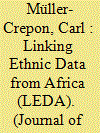

|
|
|
|
|
| Summary/Abstract |
Social scientists in general and conflict researchers in particular increasingly combine multiple datasets to study ethnic politics and conflict in Africa. We facilitate these efforts by systematically linking over 8,100 ethnic categories from 11 databases, including surveys, geographic data, and expert-coded lists. Exploiting the linguistic tree from the Ethnologue database, we propose a systematic solution to the grouping problem of ethnicity. An analysis of political exclusion, mistrust of state leaders, and ethnic grievances highlights different ways of linking ethnic categories from multiple datasets. The LEDA open-source software package allows researchers to link ethnic groups from any database with explicit rules and to add their own data on ethnic groups.
|
|
|
|
|
|
|
|
|
|
|
|
|
|
|
|
| 10 |
ID:
185189
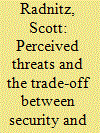

|
|
|
|
|
| Summary/Abstract |
It is well established that exposure to threats causes citizens to prioritize security considerations and accept restrictions on civil liberties. Yet most studies on which these findings are based come from longstanding democracies and do not distinguish among types of threat. This article argues that the effects of internal and external threats are conditional on regime type. It tests the argument via an experiment embedded in an original survey of Georgia and Kazakhstan, countries that vary in regime type but face similar levels of threat. In authoritarian Kazakhstan, there is no difference in attitudes by threat type, whereas external threats produce greater support for security than internal ones in more pluralistic Georgia. Contrary to previous research, security preferences are not mediated by the triggering of anxiety. The findings contribute to literatures on the link between threats and authoritarian preferences, the rally-round-the-flag effect, and the ways that political institutions mediate psychological processes.
|
|
|
|
|
|
|
|
|
|
|
|
|
|
|
|
| 11 |
ID:
185185
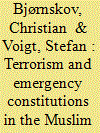

|
|
|
|
|
| Summary/Abstract |
Previous research has indicated that constitutionalized emergency provisions effectively constrain the behaviour of democratic governments subsequent to terrorist attacks. In this article, we ask if this is also true for autocratic governments. Are non-democratic governments equally subject to constitutionalized constraints regarding their reactions to emergencies and particularly to terrorist attacks? To answer the question, we analyse the behaviour of a specific group of predominantly autocratic governments that are particularly subject to frequent terrorist incidents, namely the states that are members of the Organisation of Islamic Cooperation. Employing data on terrorist activity from the Global Terrorism Database and constitutional data from the Index of Emergency Powers, we estimate the association between constitutionalized constraints and terrorist attacks in a dataset covering 48 member-states of the organization observed annually between 1970 and 2014. As hypothesized, we find that emergency constitutions that politically make it relatively cheap for governments to declare a state of emergency are more likely to be invoked. In addition, we find that governments are more likely to increase repression after terrorist events when the constitution allocates more discretionary power to the government in emergencies. Our evidence thus suggests that emergency constitutions also impact on the behaviour of largely autocratic governments.
|
|
|
|
|
|
|
|
|
|
|
|
|
|
|
|
|
|
|
|
|